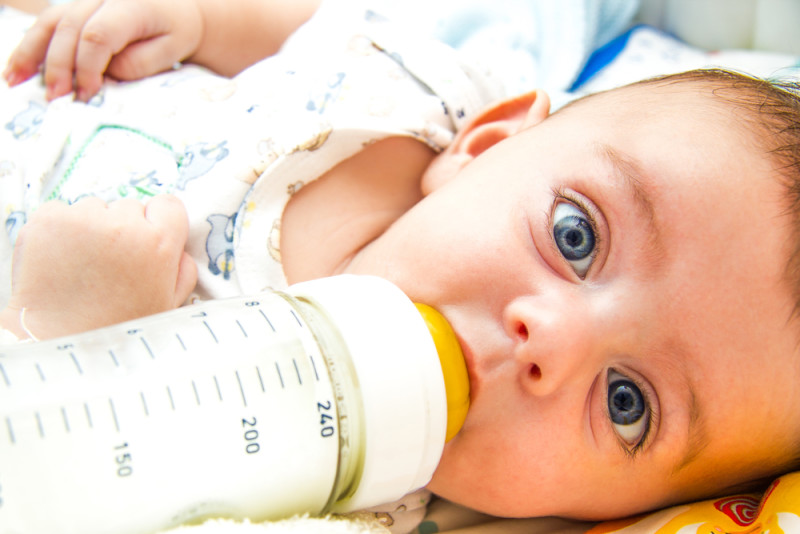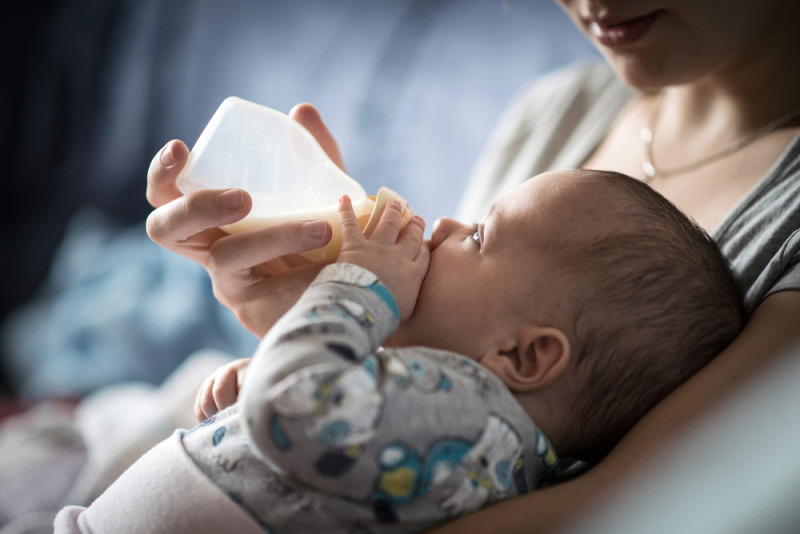How you choose to feed your child is one of the important and earliest choices you make for them. When you give your baby a bottle you want to make sure you are doing it safely and smartly, but where do you start? What kinds of bottles should you buy and how many do you need? Well, don’t worry! Here is the only guide you’ll ever need to bottle feed!
 To Get Started
To Get Started
One of the first things you need to know is what you need! No matter what kind of bottle you choose you will most definitely need:
- A minimum of six bottles
- A minimum of six nipples
- Sterilizing equipment
- Bottle and nipple brush
What Type of Bottle?
No doubt if you’ve taken a stroll down the baby aisle at any store you are well aware of the numerous amounts of options available when it comes to bottles. Which is best? That’s really a personal preference. Here’s a breakdown of the types available:
- Basic baby bottle. These come in a variety of size with no real bells and whistles, just a basic baby bottle. They are good because they can be used with most warmers, sterilizers and carriers and also come with nipples and lids most of the time. The drawback to these is that your baby may swallow air as he or she feeds.
- Anti-colic bottle. No one is really sure what causes colic, but for some babies it’s an upset tummy. These bottles are designed to reduce the amount of air your baby swallows as they feed. They do tend to be more expensive than basic bottles and may not work to reduce colic in all babies. Plus, some have a lot of parts to clean.
- Sterilizer bottle. A bottle like this can be popped in the microwave to be sterilized, which makes them really convenient. They can be more expensive, though and require careful handling during sterilization because they get hot!
- Disposable bottle. These are pre-filled bottles that have a cap and a nipple attached. After you’re done with them, you throw them away. This makes them convenient when you’re out and about but it’s not a very environmentally friendly way to bottle feed.
- Glass bottle. These are made of glass that is tempered, and is a great alternative for parents that don’t want to use plastic products. They’re environmentally friendly and durable but are heavy and can obviously shatter if dropped. They’re also more expensive.
- Silicone baby bottle. Honest offers a silicone baby bottle that has the advantage of being free of plastics but also won’t shatter like glass. These are also anti-colic and easy to clean.
 Sterilizers
Sterilizers
If you bottle feed then you will need to sterilize, even after washing the bottle. Sterilizing serves to kill germs that could cause your baby to have an upset tummy – and no one wants a baby with an upset tummy! The four ways to sterilize are:
- Boiling – good old-fashioned boiling will get the job done; just throw everything in a pot of boiling water for about 10 minutes. This is an inexpensive and convenient way to sterilize, but it can put a lot of wear and tear on the bottles and nipples.
- Cold sterilizing – this is when you soak everything in a special sterilizing solution. It’s a great method when you’re traveling and is inexpensive but the solution has been known to have a strange smell and it’s not a very fast method since the bottles must soak for at least 30 minutes.
- Steam sterilizing – this uses a special electric steamer to steam up to 6 bottles at a time. It’s quick and might even be able to be sterilized your breast pump parts too. It’s not an easy method when you’re on the road, though and can be a bit expensive.
- Microwave sterilizing – special containers are available that fit inside of your microwave that will sterilize bottles. It’s fast and convenient but also may not be compatible with all bottles and nipples, so you have to check.
A Note about Nipples
Nipples come in different flows, sizes and materials. You need to match the flow with the age and development of your baby, but finding the right nipple for you baby usually involves a lot of trial and error. Some babies may prefer a nipple that mimics a mother’s nipple, while some may like latex or silicone nipples. There are also anti-colic nipples to reduce the amount of air you baby gets while feeding and even disposable nipples for travel.
No matter what style of nipple you choose, you will always need to be diligent to check for cracks or breakdown in the material. A damaged nipple could become a choking hazard for your baby.
In the End
Only you and your baby can choose what is right. Just be prepared to try a few different kinds before you find one that works. Don’t sweat it too much, because before you know it you’ll have this whole newborn baby thing figured out!
Leave a Reply